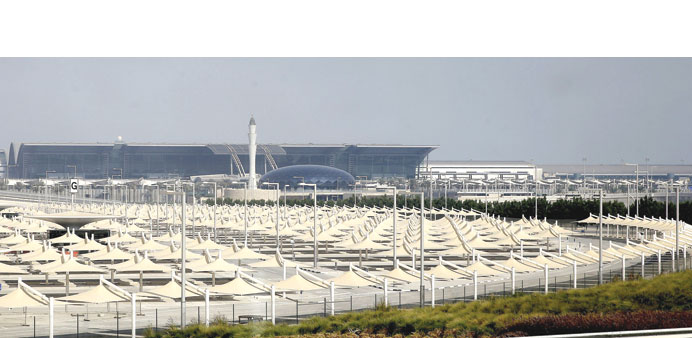Bloomberg/Dubai
A nuclear deal between Iran and countries including the US and Russia could prompt sovereign upgrades of Gulf Arab nations even as it may cut their revenue by causing oil prices to fall, according to IHS Inc.
“The reduction in geopolitical risk would serve as a key trigger for a sovereign ratings review for the countries of the Gulf Co-operation Council, and potentially an upgrade,” Bryan Plamondon, an economist specialising in the Middle East at energy consultant IHS, said on Wednesday by e-mail from Lexington, Massachusetts. “Countries would then likely see benefits in the form of lower borrowing costs and greater foreign investment.”
Talks between Iran and the so-called P5+1 group of world powers resumed on Wednesday at diplomats level in Geneva. “Differences that remain between the parties are narrow, and I believe they can be bridged with political will and commitment,” UK Foreign Secretary William Hague said in London.
Concern that Iran seeks to make an atomic bomb and the civil war in Syria, where Iran supports President Bashar al- Assad, have helped boost crude prices to more than $115 a barrel twice in the past 12 months.
All six GCC nations are ranked as investment grade at Moody’s Investors Service and Standard & Poor’s. The agencies respectively rate Kuwait, Qatar and the UAE as Aa2 or AA, Saudi Arabia as Aa3 and AA-, Oman as A1 and A, and Bahrain as Baa2 and BBB.
Qatar seeks to raise its S&P rating by two levels to AAA, putting it on par with countries including Canada and Norway, former minister of Economy and Finance Yousef Hussein Kamal said in March.
Iran’s government says its programme to enrich uranium is intended for electricity generation and other peaceful purposes. The US and the European Union dispute the claim and have imposed economic sanctions on Tehran to try to halt its nuclear progress. The EU stopped buying Iranian crude as of July 2012, and Iran has made sporadic threats to shut the Strait of Hormuz, a transit point for one fifth of the world’s seaborne oil.
Iran was the second-largest producer in the Organisation of Petroleum Exporting Countries until last year, then tumbled to sixth place as sanctions toughened. The country pumped 2.6mn bpd in October, data compiled by Bloomberg show.
Emad Mostaque, a London-based strategist at Noah Capital Markets, said oil prices could drop by $15 a barrel should a diplomatic settlement remove the risk of conflict and allow Iran to maximise its crude exports by as much as 2mn bpd. Iran’s neighbours in the GCC supplied 20.9mn barrels on average in 2012, or about 24% of the world’s oil last year, according to data from BP.
“The major Gulf states have minimal debt and huge cash positions, so it’s unlikely any nuclear agreement will cause significant tightening” of their public finances, he said in a November 17 e-mail.
Saudi Arabia, the UAE and Kuwait would “certainly” be able to handle a decline in oil prices if a settlement with Iran leads to greater flows of Iranian crude to market “or, at a minimum, a reduction in the risk premium associated with Iran,” said Plamondon of IHS.
Hassan Rohani, the new Iranian President, and UK Prime Minister David Cameron agreed in a November 18 phone call - the first such direct contact between their governments in more than a decade - to make the most of the latest round of talks, according to a statement from the UK prime minister’s office.
Opec may need to curb output next year amid increasing crude supply from producers outside the group such as the US and Kazakhstan, Citigroup said in a report earlier this week. The group has kept its output target at 30mn bpd since 2011 and will meet on December 4 to reassess the limit.
With Qatar planning to spend $200bn on infrastructure in preparation for playing host to the soccer World Cup in 2022, an upgraded credit rating would save the country billions of dollars, Plamondon said.
The UAE would benefit from renewed trade with Iran. Dubai’s commerce with Iran fell 31% in 2012 and 12% in the first half of this year, he said.
Qatar “shares with the other GCC member states a moderate degree of geopolitical event risk arising from regional and global tensions vis-a-vis Iran,” Moody’s said earlier in the week. The agency on November 14 confirmed Saudi Arabia’s Aa3 rating, which, it said, incorporated “an element of geopolitical risk because of its strategic rivalry with Iran.”
Prices for Brent crude, a benchmark for more than half of the world’s oil, would have to slip below $80 a barrel before Qatar and Saudi Arabia post financial deficits, S&P said on November 18. Opec’s collective “basket” price averaged $104.58 a barrel on Wednesday.
“Reduced tension and a rise in Iranian oil sales will mean a lower price, but the trade and budget balances of countries like the UAE are quite strong,” Giyas Gokkent, chief economist at the National Bank of Abu Dhabi, said in an e-mail on November 17. “If these come down a bit, there won’t be a rating impact.”

A general view of the Hamad International airport in Doha. With Qatar planning to spend $200bn on infrastructure in preparation for playing host to th
